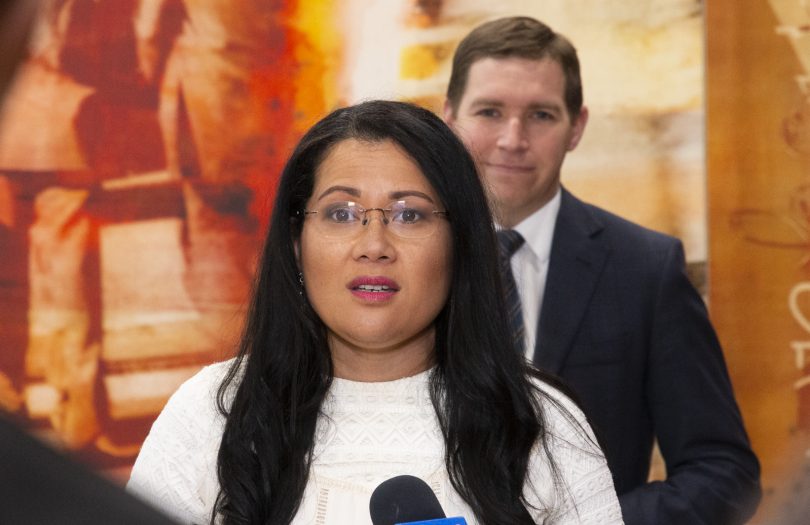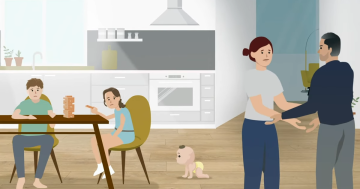
“It has been very difficult to adopt a child in the ACT,” says Bernadette Blenkiro. Photo: Supplied.
The complex process of adoption in the ACT has become a little clearer following amendments to legislation that recognises the needs of an adopted child.
The changes will make adoption processes more child-centred by expanding the definition of what’s in the best interest of the child. This expansion will include consideration of the preservation of cultural inheritance and identity of the child, intellectual needs, emotional and stable living conditions, existing relationships and the need to protect the child from exposure to abuse or neglect.
The long-awaited changes passed through the Legislative Assembly last week after an exhaustive four-year consultation process by a Domestic Adoptions Taskforce that found the adoption process should be more child-centred by expanding the definition of what’s in the best interest of the child.
Bernadette Blenkiron is the recognised parent of two adopted children. However, laws in the ACT that failed to recognise the best interests of a child made it almost impossible to present a matter before a court to have the needs of an adopted child recognised.
“An adopted child who has been in a loving family for all these years, with a family they know, shouldn’t be left feeling that potentially they may face having to leave that family,” Ms Blenkiron said.
The new legislation follows laws introduced in July that will see both birth parents and adoptive parents named on the birth certificates of adopted children.
The latest amendment was first advocated for in 2015 by the then Shadow Minister for Families and Community Services, Nicole Lawder, who moved motions in the Assembly to improve adoption processes for children and adoptive parents.
A task force was established in 2016 which recommended legislative change following extensive consultation with children, young people, families, relevant organisations and professionals who were invited to make written and verbal submissions.
This consultation process raised challenges such as the needs of the child versus the needs of adults, obtaining factual information from a birth parent/s and the length of the adoption process.
“While these are small changes, they are important to ensuring the wellbeing of children is the focus of the adoption process,” Ms Lawder said last week.
“Adoption is an incredibly complex and nuanced process which requires great sensitivity. After years of pushing for reform, I am pleased that the Assembly is taking this positive step forward.”

Elizabeth Kikkert says the “bill puts the best interests of the child first”. Photo: Dominic Giannini.
The Shadow Minister for Families, Youth and Community Services, Elizabeth Kikkert, moved the amendment last week to ensure the application of the new laws can be assessed, saying “this bill puts the best interests of the child first”.
However, Ms Blenkiron said it is still extremely difficult to adopt a child in the ACT due to the obvious needs for checks and balances to occur.
She said it is also mandated that links to birth parents are required even in cases where neglect or abuse is evident.
“In this system, anything you do must maintain links to the birth family, so adoption comes with a requirement that there is always some kind of involvement.
“It has been very difficult to adopt a child in the ACT, almost impossible because the laws have not reflected the needs of a child,” Ms Blenkiron said.
She said courts are laden with disputes such as where a birth parent has claimed their child is Indigenous, which has added lengthy delays to the process.
For those going down the adoption path in the ACT, two broad categories exist. The most common being adoption by a carer or other person known to the child (referred to as ‘known adoption’). The other is adopting a child from another country.
According to the Australian Institute of Health and Welfare, 310 children were adopted in Australia in 2018–19, of which 82 per cent were Australian children and 18 per cent from another country.
In the 25-year period between 1994-95 and 2018-19, there has been a 64 per cent decline in finalised adoptions in Australia.
In the ACT, there were six adoptions in 2018-19, six in 2017-18, 10 in 2016-17, five in 2015-16 and nine in 2014-15.
An ACT Government spokesperson said no data is available on the number of children wanting to be adopted; however, children requiring care are afforded stability and permanent care arrangements wherever possible.
Minister for Children, Youth and Families Rachel Stephen-Smith said the amendments give better guidance to the Court on what should be considered when making important decisions about the future of a child or young person.
“We have heard clearly that the best interests of the child and young person should be at the centre of every decision made. Consultation also highlighted the need to support children and young people to participate in decision-making about their own lives,” Ms Stephen-Smith said.
“Permanency and stability lead to children and young people living healthier, happier lives. These changes will create a more transparent and less adversarial process for everyone involved.”
Further information about the adoption process and reforms are on the community services section of the ACT Government website.




















